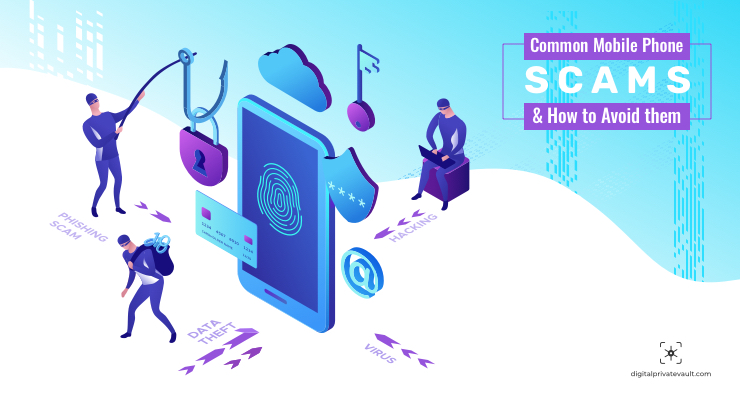09 Oct, 2019

Cybercriminals are always on the hunt to cash into technology vulnerability — and our phones being one of the easiest exploitable targets. As per a report, mobile phone scams are ever-increasing — from 3.7 percent in 2017 to expected plaguing growth of 44.6 percent in 2019. And that’s indeed a sinister trend. So in this article, we decided to discuss the common types of phone scams and some tips to avoid them.
As per the name implies, subscriber fraud occurs when a criminal opens a subscriber account under the victim’s name, i.e. subscribes to the mobile plans, using the personal information without their authorization. As a result, the unaware victim has to pay the ridiculously high bills for the services used by the crook. In this type of scam, both the carrier provider and the victim have to bear a severe loss.
Even when the fraud is discovered, it’s quite difficult to prove that the services are not used by the victim — the reason being the criminal successfully provided the identification information while opening the account. This fraud takes a long time to resolve and even longer to clear the bills incurred.
You need to be cautious about your personal information and avoid sharing it. Contact your phone carrier provider immediately whenever you feel you have been scammed by such fraud.
One in four breaches in financial services is reported due to stolen phones and there are 70 million smartphones lost every year. These sinister stats clearly depicts the amount of damage that stolen phones can make. Apart from the breaches in financial services criminals can exploit the data on your phone, make unauthorized calls, misuse personal information and more.
Cloning is one of the phone scams where the hacker steals the cellphone’s identity and clones it to get free carrier services. Although it is not much prevalent these days, cell phone cloning can cause from triviality to catastrophe for the victim. For instance, the cloned phone can be used to make expensive calls — where the victim bearing the bill to any kind of criminal activity or transgression.
Cloning is a two-step process in which the criminal scans your phone signals to detect the identity number of the SIM and uses a SIM reader to clone it. However, this phone scam is not a vexing issue these days because modern phones come with greater security.
SMS Phishing, also known as SmiShing is a phone scam where the tricksters try to get your personal information. These messages try to trick you in different ways. For example, the con man masquerades themselves as a friend or relative or someone from the bank.
The messages may also include misleading information or sweepstakes to lure you. And once you fall in the trap, by clicking on the link or calling on the number they try to attain access to your personal information through social engineering or even injecting malware in your phone.
Ransomware is a type of malware that blocks access to the victim’s data and attempts to extort money from the victim. It is spread through email with malicious attachments, infected websites or social media links. Once the user accesses the link, malware is installed on the phone without the user’s knowledge.
Once installed, the criminal behind ransomware instills fear into the victim that causes them to pay the ransom. It may look like an official message levying fine for accessing illegal content or a threatening message to pay the ransom within the stipulated time to recover the data. However, even paying the ransom to the criminal doesn’t guarantee the release or recovery of data.
One-ring and recorded message scams both typically work the same way. In the one-ring scam, you’ll receive annoying miss calls from the scammer motivating you to call back. While the recorded message scams are generally some sort of voicemails prompting you to call on the given number.
The ultimate goal of the criminal is to make you call back on the number and you’ll be charged an outrageous fee from your carrier. The only way to avoid such phone scams — don’t call back to the numbers and report it to your carrier.
So now that you have insights into the common mobile phone scams it’s time to keep yourself safe. Stay updated about the privacy and security trends, educate your friends and families and treat your phone’s security as an utmost concern.
 3196
3196 By Goldy Benedict
By Goldy Benedict  By Goldy Benedict
By Goldy Benedict